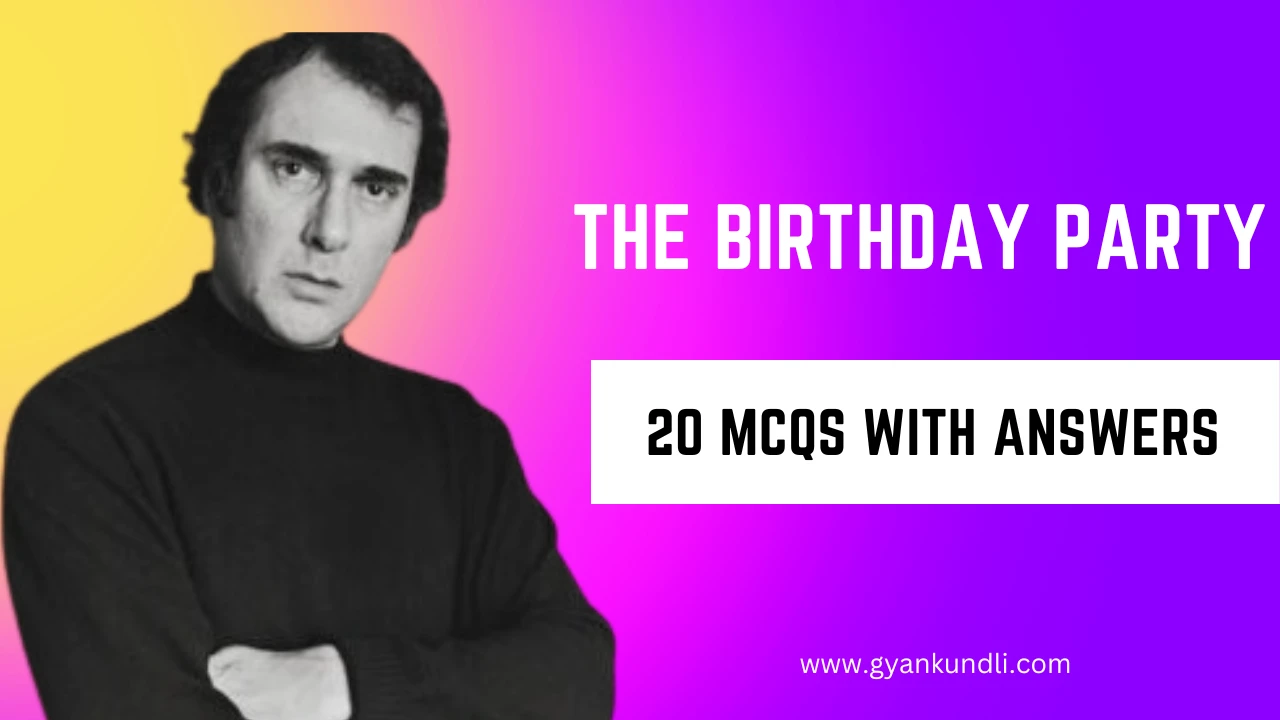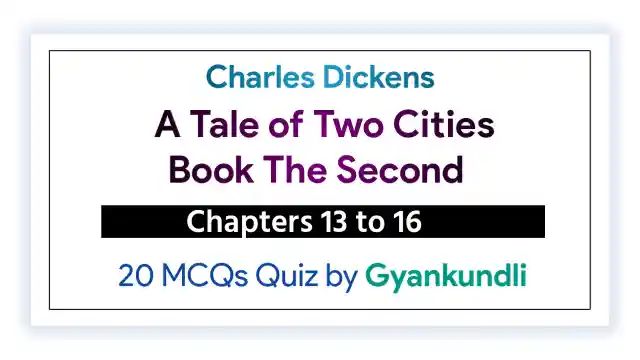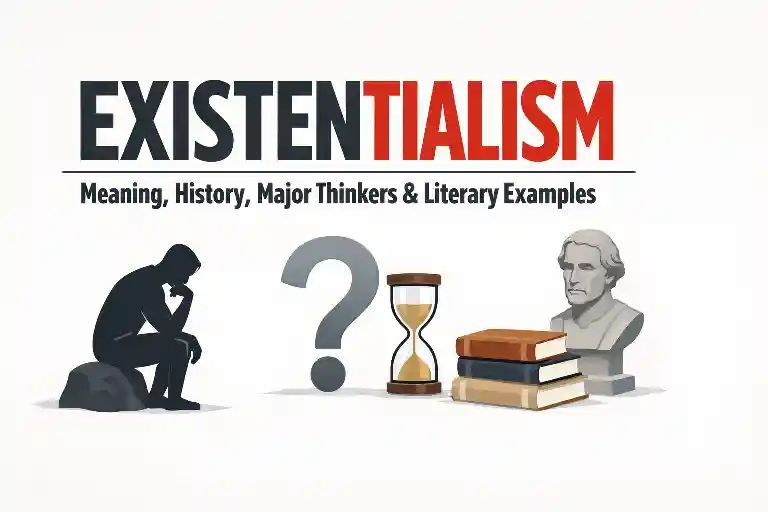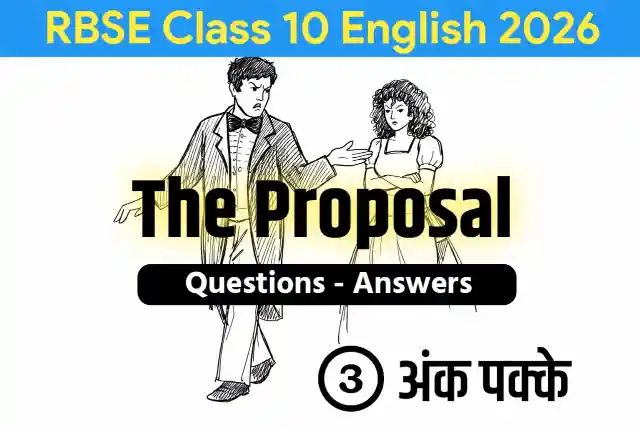1. The main setting of “The Birthday Party” is:
(a) A bustling city nightclub
(b) A seaside boarding house with a claustrophobic atmosphere
(c) A bustling theater backstage filled with drama
(d) A secluded cabin in the woods offering isolation
2. Stanley, the play’s central figure, is primarily identified as:
(a) A writer grappling with creative blocks
(b) A pianist struggling with past demons
(c) A retired businessman seeking quiet refuge
(d) A journalist caught in a dangerous investigation
3. The arrival of Goldberg and McCann on Stanley’s birthday disrupts the household by:
(a) Throwing a surprise party with boisterous friends
(b) Engaging in philosophical discussions with Meg
(c) Launching a cryptic interrogation and exerting control
(d) Delivering a mysterious package and departing quickly
4. In the play, the seemingly innocuous game of “Snap” likely functions as:
(a) A nostalgic pastime to reminisce about childhood
(b) A tool for Goldberg and McCann to assess Stanley’s memory
(c) A catalyst for escalating tension and power dynamics
(d) A comic relief distraction from the unsettling atmosphere
5. The flickering candlelight throughout the play serves to:
(a) Create a romantic ambiance
(b) Highlight the characters’ physical beauty
(c) Cast grotesque shadows and amplify tension
(d) Symbolize hope and warmth amidst uncertainty
6. Lulu, the young woman who arrives, stands out for:
(a) Her quiet demeanor and conservative dress
(b) Her flamboyant attire and theatrical gestures
(c) Her insightful observations and philosophical discourse
(d) Her deep knowledge of local history and folklore
7. Which interpretation of the play’s ending is most plausible?
(a) Stanley finds refuge and acceptance with Lulu
(b) Goldberg and McCann prevail, leaving Stanley’s fate uncertain
(c) Meg asserts control, restoring order to the boarding house
(d) The play concludes with a clear resolution and closure
8. Pinter’s signature technique of “silences” contributes to:
(a) Speedy exposition and efficient storytelling
(b) A realistic portrayal of everyday conversations
(c) Heightened tension and unspoken anxieties
(d) Comic relief and lighthearted interruptions
9. A recurring symbol in the play that represents memory and its fragility is:
(a) A locked door hinting at forbidden secrets
(b) A ticking clock emphasizing the passage of time
(c) A shattered mirror reflecting fragmented identities
(d) A peeling banana highlighting the absurdity of existence
10. The play’s title, “The Birthday Party,” most likely serves as a metaphor for:
(a) The joy of celebrating aging and new beginnings
(b) The anxieties and vulnerabilities surrounding identity
(c) The disruption of normalcy by external forces
(d) The absurdity and unpredictable nature of life
11. The arrival of Goldberg and McCann disrupts the household by:
(a) Introducing a sense of playful chaos and unexpected entertainment.
(b) Creating an atmosphere of suspicion, interrogation, and unease.
(c) Bringing news of a long-lost relative and renewed family connections.
(d) Sharing valuable life advice and promoting personal growth.
12. The role of Meg, the boarding house owner, can be described as:
(a) A maternal figure offering comfort and understanding to Stanley.
(b) A shrewd businesswoman focused on maintaining order and profit.
(c) A passive observer caught in the unsettling events without taking sides.
(d) A mischievous accomplice secretly aiding Goldberg and McCann’s goals.
13. The seemingly mundane game of “Snap” in the play functions as:
(a) A nostalgic reminder of childhood memories and simpler times.
(b) A tool for revealing hidden truths and exposing vulnerabilities.
(c) A source of lighthearted competition and shared laughter.
(d) A symbolic representation of the struggle for control and dominance.
14. Pinter’s use of silence in the play contributes to:
(a) Fusing together scenes and creating a seamless flow of dialogue.
(b) Highlighting the awkwardness and discomfort of social interactions.
(c) Amplifying tension and unspoken anxieties, prompting audience engagement.
(d) Offering moments of peaceful reflection and contemplative stillness.
15. The birthday party itself, within the context of the play, can be interpreted as:
(a) A joyous celebration of new beginnings and personal growth.
(b) A ironic reminder of isolation and the passage of time.
(c) A pretext for gathering information and manipulating Stanley.
(d) A catalyst for exploring deeper themes of identity and societal pressures.
16. The recurring symbol of the ticking clock in the play suggests:
(a) The urgency of taking action and seizing opportunities in life.
(b) The inevitability of aging and the fleeting nature of time.
(c) The presence of an external threat or impending danger.
(d) The monotonous routine and sense of stagnation surrounding Stanley.
17. In contrast to the unsettling atmosphere, why might Pinter incorporate moments of humor in the play?
(a) To provide comic relief and lighten the mood for the audience.
(b) To highlight the absurdity and contradictions within the situation.
(c) To create a sense of unease and confusion through juxtaposition.
(d) To portray the characters’ ability to cope with hardship through laughter.
18. Lulu’s arrival disrupts the existing dynamic by:
(a) Offering Stanley a romantic possibility and potential escape.
(b) Introducing a further layer of mystery and ambiguity to the narrative.
(c) Challenging Goldberg and McCann’s authority and control.
(d) Bringing news from the outside world, offering a connection to reality.
19. The play’s ending, characterized by its ambiguity, allows the audience to:
(a) Provide definitive answers and resolve the unanswered questions.
(b) Interpret the characters’ fates and consider different possibilities.
(c) Feel satisfied with a clear conclusion and emotional closure.
(d) Recognize the complexity of human nature and the elusiveness of truth.
20. The main message or takeaway of “The Birthday Party” could be:
(a) The importance of celebrating life and cherishing loved ones.
(b) The dangers of external manipulation and the struggle for identity.
(c) The absurdity of existence and the uncertainty of human relationships.
(d) The power of silence and communication in understanding oneself and others.
Answers
1. (b) – The play takes place in the cramped and unsettling atmosphere of a seaside boarding house.
2. (b) – Stanley is primarily identified as a pianist with a mysterious past that haunts him.
3. (c) – Goldberg and McCann’s arrival disrupts the household by subjecting Stanley to a cryptic interrogation and exerting control over him.
4. (c) – The seemingly casual game of “Snap” becomes a tool for Goldberg and McCann to test Stanley’s memory and manipulate him further.
5. (c) – The flickering candlelight casts grotesque shadows and amplifies the tension and uncertainty surrounding the situation.
6. (b) – Lulu stands out for her flamboyant attire and theatrical gestures, adding a layer of unsettling mystery to the play.
7. (b) – The ending remains ambiguous, leaving Stanley’s fate uncertain and open to interpretation.
8. (c) – Pinter’s use of silences creates a sense of unease and unspoken tension, forcing the audience to fill in the gaps with their own anxieties.
9. (b) – The ticking clock is a recurring symbol that emphasizes the passage of time and the fleeting nature of memory.
10. (b) – The title can be interpreted as a metaphor for the anxieties and vulnerabilities surrounding identity, particularly in the face of external threats and manipulations.
11. (b) Creating an atmosphere of suspicion, interrogation, and unease. This option best reflects the tension and discomfort Goldberg and McCann’s arrival brings to the household.
12. (b) A shrewd businesswoman focused on maintaining order and profit. Meg often prioritizes keeping the house running smoothly and avoids emotional entanglements, though other interpretations see her as more compassionate or conflicted.
13. (b) A tool for revealing hidden truths and exposing vulnerabilities. The game becomes a test for Stanley, revealing his anxieties and lack of agency under Goldberg and McCann’s scrutiny.
14. (c) Amplifying tension and unspoken anxieties, prompting audience engagement. Pinter’s silences leave space for viewers to fill in the gaps, increasing the unsettling atmosphere and inviting active interpretation.
15. (b) An ironic reminder of isolation and the passage of time. The birthday party, meant to celebrate Stanley, exposes his loneliness and the arbitrary nature of milestones.
16. (b) The inevitability of aging and the fleeting nature of time. The constant ticking serves as a reminder of time’s relentless march and Stanley’s lack of control over it.
17. (b) To highlight the absurdity and contradictions within the situation. Pinter often uses humor to underline the illogicality and discomforting aspects of the play’s events.
18. (b) Introducing a further layer of mystery and ambiguity to the narrative. Lulu’s motives and her connection to the larger situation remain unclear, adding another layer of complexity.
19. (b) Interpret the characters’ fates and consider different possibilities. The unresolved ending allows for individual interpretations and contemplation of what might become of Stanley and the others.
20. (b) The dangers of external manipulation and the struggle for identity. The play explores themes of control, questioning identity, and the impact of external forces on one’s sense of self.
Discover more from Gyankundli
Subscribe to get the latest posts sent to your email.













